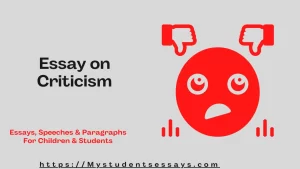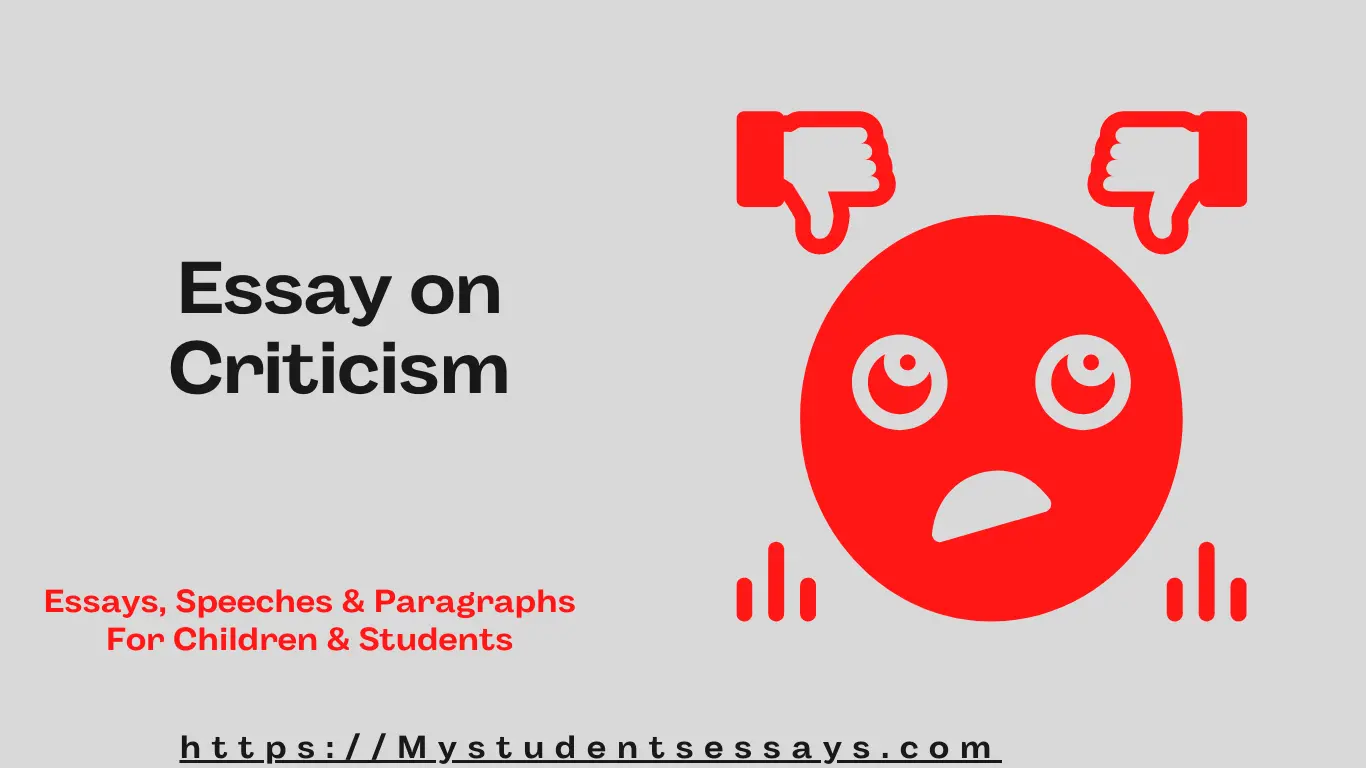Criticism is everywhere in the life today. There are various forms and causes of criticism. This is written an Essay on Criticism with meaning, concept, importance, causes of criticism in Life.
Essay on Criticism, | Meaning, Causes of Criticism in Life
Criticism is defined as the practice of evaluating the merits and demerits of something. It is an essential part of our lives, whether we realize it or not. Criticism can be helpful in many ways. It can improve our understanding of a situation, identify our flaws so that we can work on them, provide constructive feedback that leads to better decision-making, etc.
Meaning & Concept
The literal meaning of criticism is “the act of judging harshly and finding fault”. It is often seen as a negative act, but it doesn’t have to be. Criticism can be positive or negative. Positive criticism is constructive and helps us improve, while negative criticism is destructive and only serves to bring us down.

Why Criticism is Important?
Criticism is important because it helps us to see things from a different perspective. It allows us to evaluate our actions and decisions, and determine whether or not they are effective. Criticism can also help us to learn from our mistakes so that we don’t repeat them in the future.
>>>>> Related Post: ” Essay on Change“
Does Criticism help in Bringing improving in one’s life?
Yes, criticism definitely has the potential to bring about improvement in our lives. However, it is important to note that not all criticism is constructive. Some criticism may be well-intentioned but ultimately unhelpful, while other criticisms may be outright malicious. It is important to be discerning when taking in criticism, and to only accept those criticisms that will actually be helpful in bringing about improvements in our lives.
Drawbacks of Criticism
A few possible drawbacks of criticism are that it can be hurtful, it can discourage creativity, and it can lead to resentment. Additionally, some people may react negatively to criticism regardless of its content, simply because they don’t like being told what to do or how to improve. It is important to be aware of these potential drawbacks when offering criticism, and to try to Criticism in a way that is respectful and helpful.
One of the major impacts of criticism is that it can lead to a decrease in self-confidence. When students are constantly being told that they are not good enough, they may start to believe it. This can lead to a decrease in motivation and effort, as well as a general feeling of discouragement. Additionally, excess criticism can also lead to resentment. If students feel like they are constantly being berated or put down, they may start to resent those who are criticising them. This can lead to a breakdown in relationships and further decrease in motivation.
Handling Criticism:
There is no one-size-fits-all answer to this question, as everyone handles criticism differently. Some people may be able to take it in stride, while others may need some time to process it. However, there are a few general tips that can be helpful when learning how to handle criticism:
1. Try to remain calm and open-minded when receiving criticism. It can be difficult to hear negative feedback about ourselves, but it is important to try to see it as an opportunity for growth rather than a personal attack.
2. Don’t take it personally. This is easier said than done, but it is important to remember that criticism is not always a reflection of who we are as individuals. Sometimes, people may be critical of our actions or ideas without knowing all the facts, or they may simply disagree with us.
3. Consider the source. Not all criticism is created equal. Some people may be more qualified to offer criticism than others, and some criticisms may be more helpful than others. It is important to consider the source of the criticism before taking it to heart.
4. Respond calmly and constructively. If we react angrily or defensively to criticism, we are likely to only make the situation worse.
>>>>> Related Post: ” Essay on Me & My Big Mouth ”
Conclusion
In conclusion, criticism is an important part of our lives, whether we realize it or not. It can help us to improve our understanding of a situation, identify our flaws so that we can work on them, and provide constructive feedback that leads to better decision-making. However, not all criticism is constructive, and it is important to be discerning when taking in criticism. Only accept those criticisms that will actually be helpful in bringing about improvements in our lives.
